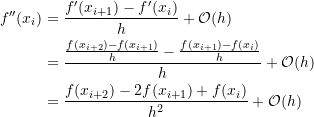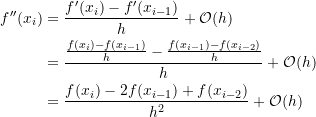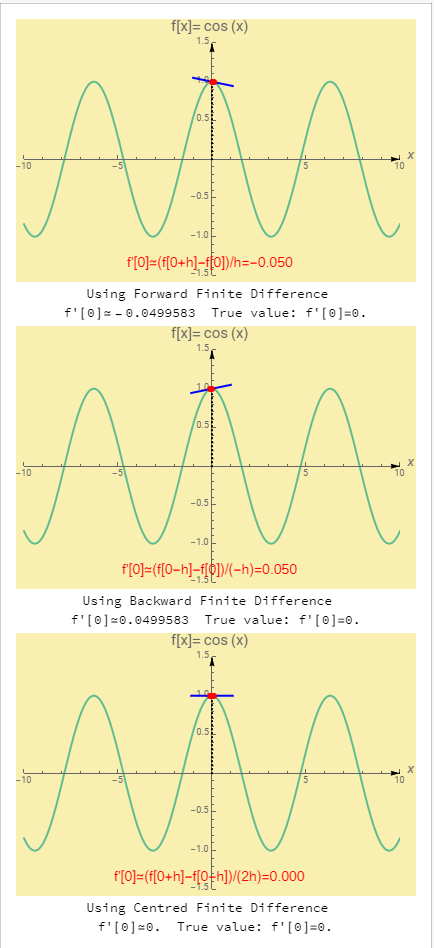Numerical Differentiation: Basic Numerical Differentiation Formulas
Basic Numerical Differentiation Formulas
The numerical differentiation formulas presented in the Taylor Series section will be repeated here.
Forward Finite Difference
Let ![]() be differentiable and let
be differentiable and let ![]() ,then, using Taylor theorem:
,then, using Taylor theorem:
![]()
where ![]() . In that case, the forward finite-difference can be used to approximate
. In that case, the forward finite-difference can be used to approximate ![]() as follows:
as follows:
(1) ![]()
where ![]() indicates that the error term is directly proportional to the chosen step size
indicates that the error term is directly proportional to the chosen step size ![]() .
.
Backward Finite Difference
Let ![]() be differentiable and let
be differentiable and let ![]() , then, using Taylor theorem:
, then, using Taylor theorem:
![]()
where ![]() . In this case, the backward finite-difference can be used to approximate
. In this case, the backward finite-difference can be used to approximate ![]() as follows:
as follows:
(2) ![]()
where
Centred Finite Difference
The centred finite difference can provide a better estimate for the derivative of a function at a particular point. If the values of a function ![]() are known at the points
are known at the points ![]() and
and ![]() , then, we can use the Taylor series to find a good approximation for the derivative as follows:
, then, we can use the Taylor series to find a good approximation for the derivative as follows:
![Rendered by QuickLaTeX.com \[\begin{split}f(x_{i+1})&=f(x_i)+f'(x_i)h+\frac{f''(x_i)}{2!}h^2+\mathcal{O}(h^3)\\f(x_{i-1})&=f(x_i)+f'(x_i)(-h)+\frac{f''(x_i)}{2!}h^2+\mathcal{O}(h^3) \end{split}\]](https://engcourses-uofa.ca/wp-content/ql-cache/quicklatex.com-79009974b13e5f899e335f74d2bb6773_l3.png)
subtracting the above two equations and dividing by ![]() gives the following:
gives the following:
![]()
where ![]() indicates that the error term is directly proportional to the square of the chosen step size
indicates that the error term is directly proportional to the square of the chosen step size ![]() . I.e., the centred finite difference provides a better estimate for the derivative when the step size
. I.e., the centred finite difference provides a better estimate for the derivative when the step size ![]() is reduced compared to the forward and backward finite differences. Notice that when
is reduced compared to the forward and backward finite differences. Notice that when ![]() , the centred finite difference is the average of the forward and backward finite difference!
, the centred finite difference is the average of the forward and backward finite difference!
The following tool illustrates the difference between forward, backward, and centred finite difference when calculating the numerical derivative of the function ![]() at a point
at a point ![]() wit ha step size
wit ha step size ![]() . Click on the picture to activate the tool and move the slider to vary the value of
. Click on the picture to activate the tool and move the slider to vary the value of ![]() and
and ![]() to see the effect on the calculated deriative. The centred finite difference in most cases provides a closer estimate to the true value of the derivative.
to see the effect on the calculated deriative. The centred finite difference in most cases provides a closer estimate to the true value of the derivative.
Basic Numerical Differentiation Formulas for Higher Derivatives
The formulas presented in the previous section can be extended naturally to higher-order derivatives as follows.
Forward Finite Difference
Let ![]() be differentiable and let
be differentiable and let ![]() , with
, with ![]() , then, using the basic forward finite difference formula for the second derivative, we have:
, then, using the basic forward finite difference formula for the second derivative, we have:
(3) 
Notice that in order to calculate the second derivative at a point ![]() using forward finite difference, the values of the function at two additional points
using forward finite difference, the values of the function at two additional points ![]() and
and ![]() are needed.
are needed.
Similarly, for the third derivative, the value of the function at another point ![]() with
with ![]() is required (with the same spacing
is required (with the same spacing ![]() ). Then, the third derivative can be calculated as follows:
). Then, the third derivative can be calculated as follows:
![Rendered by QuickLaTeX.com \[\begin{split}f'''(x_i) & = \frac{f''(x_{i+1})-f''(x_i)}{h}+\mathcal O (h)\\&=\frac{\frac{f(x_{i+3})-2f(x_{i+2})+f(x_{i+1})}{h^2}-\frac{f(x_{i+2})-2f(x_{i+1})+f(x_i)}{h^2}}{h}+\mathcal O (h)\\&=\frac{f(x_{i+3})-3f(x_{i+2})+3f(x_{i+1})-f(x_i)}{h^3}+\mathcal O (h)\end{split}\]](https://engcourses-uofa.ca/wp-content/ql-cache/quicklatex.com-ec8b3d851d69bc306f690f0da22ad319_l3.png)
Similarly, for the fourth derivative, the value of the function at another point ![]() with
with ![]() is required (with the same spacing
is required (with the same spacing ![]() ). Then, the fourth derivative can be calculated as follows:
). Then, the fourth derivative can be calculated as follows:
![Rendered by QuickLaTeX.com \[\begin{split}f''''(x_i) & = \frac{f'''(x_{i+1})-f'''(x_i)}{h}+\mathcal O (h)\\&=\frac{\frac{f(x_{i+4})-3f(x_{i+3})+3f(x_{i+2})-f(x_{i+1})}{h^3}-\frac{f(x_{i+3})-3f(x_{i+2})+3f(x_{i+1})-f(x_i)}{h^3}}{h} +\mathcal O (h)\\&=\frac{f(x_{i+4})-4f(x_{i+3})+6f(x_{i+2})-4f(x_{i+1})+f(x_i)}{h^4}+\mathcal O (h)\end{split}\]](https://engcourses-uofa.ca/wp-content/ql-cache/quicklatex.com-4c8e401c80c58713e2866981d8b57ba6_l3.png)
Backward Finite Difference
Let ![]() be differentiable and let
be differentiable and let ![]() , with
, with ![]() , then, using the basic backward finite difference formula for the second derivative, we have:
, then, using the basic backward finite difference formula for the second derivative, we have:
(4) 
Notice that in order to calculate the second derivative at a point ![]() using backward finite difference, the values of the function at two additional points
using backward finite difference, the values of the function at two additional points ![]() and
and ![]() are needed.
are needed.
Similarly, for the third derivative the value of the function at another point ![]() with
with ![]() is required (with the same spacing
is required (with the same spacing ![]() ). Then, the third derivative can be calculated as follows:
). Then, the third derivative can be calculated as follows:
![Rendered by QuickLaTeX.com \[\begin{split}f'''(x_i) & = \frac{f''(x_{i})-f''(x_{i-1})}{h}+\mathcal O (h)\\&=\frac{\frac{f(x_{i})-2f(x_{i-1})+f(x_{i-2})}{h^2}-\frac{f(x_{i-1})-2f(x_{i-2})+f(x_{i-3})}{h^2}}{h}+\mathcal O (h)\\&=\frac{f(x_{i})-3f(x_{i-1})+3f(x_{i-2})-f(x_{i-3})}{h^3}+\mathcal O (h)\end{split}\]](https://engcourses-uofa.ca/wp-content/ql-cache/quicklatex.com-85174eb2eae4f64b226d709b98322214_l3.png)
Similarly, for the fourth derivative, the value of the function at another point ![]() with
with ![]() is required (with the same spacing
is required (with the same spacing ![]() ). Then, the fourth derivative can be calculated as follows:
). Then, the fourth derivative can be calculated as follows:
![Rendered by QuickLaTeX.com \[\begin{split}f''''(x_i) & = \frac{f'''(x_{i})-f'''(x_{i-1})}{h}+\mathcal O (h)\\&=\frac{\frac{f(x_{i})-3f(x_{i-1})+3f(x_{i-2})-f(x_{i-3})}{h^3}-\frac{f(x_{i-1})-3f(x_{i-2})+3f(x_{i-3})-f(x_{i-4})}{h^3}}{h} +\mathcal O (h)\\&=\frac{f(x_{i})-4f(x_{i-1})+6f(x_{i-2})-4f(x_{i-3})+f(x_{i-4})}{h^4}+\mathcal O (h)\end{split}\]](https://engcourses-uofa.ca/wp-content/ql-cache/quicklatex.com-9b9fa2555aec137e33146f95917550bc_l3.png)
Centred Finite Difference
Let ![]() be differentiable and let
be differentiable and let ![]() , with a constant spacing
, with a constant spacing ![]() , then, we can use the Taylor theorem for
, then, we can use the Taylor theorem for ![]() and
and ![]() as follows:
as follows:
![Rendered by QuickLaTeX.com \[\begin{split}f(x_{i+1})&=f(x_i)+f'(x_i)h+\frac{f''(x_i)}{2!}h^2+\frac{f'''(x_i)}{3!}h^3+\mathcal{O}(h^4)\\f(x_{i-1})&=f(x_i)+f'(x_i)(-h)+\frac{f''(x_i)}{2!}h^2+\frac{f'''(x_i)}{3!}(-h)^3+\mathcal{O}(h^4) \end{split}\]](https://engcourses-uofa.ca/wp-content/ql-cache/quicklatex.com-4df8fb81c5031506bfb73e67d7c98830_l3.png)
Adding the above two equations and dividing by ![]() gives the following:
gives the following:
(5) ![]()
which provides a better approximation for the second derivative than that provided by the forward or backward finite difference as the error is directly proportional to the square of the step size.
For the third derivative, the value of the function is required at the points ![]() and
and ![]() . Assuming all the points to be equidistant with a spacing
. Assuming all the points to be equidistant with a spacing ![]() , then, the third derivative can be calculated using Equation 5 as follows:
, then, the third derivative can be calculated using Equation 5 as follows:
![]()
Replacing the first derivatives with the centred finite difference value for those:
(6) 
For the fourth derivative, the value of the function at the points ![]() and
and ![]() is required. Assuming all the points to be equidistant with a spacing
is required. Assuming all the points to be equidistant with a spacing ![]() , then, the fourth derivative can be calculated using Equation 5 as follows:
, then, the fourth derivative can be calculated using Equation 5 as follows:
![]()
Using the centred finite difference for the second derivatives (Equation 5) yields:
![Rendered by QuickLaTeX.com \[\begin{split}f''''(x_i) & = \frac{\frac{f(x_{i+2})-2f(x_{i+1})+f(x_{i})}{h^2}-2\frac{f(x_{i+1})-2f(x_i)+f(x_{i-1})}{h^2}+\frac{f(x_{i})-2f(x_{i-1})+f(x_{i-2})}{h^2}}{h^2} +\mathcal O (h^2)\\&=\frac{f(x_{i+2})-4f(x_{i+1})+6f(x_{i})-4f(x_{i-1})+f(x_{i-2})}{h^4}+\mathcal O (h^2)\end{split}\]](https://engcourses-uofa.ca/wp-content/ql-cache/quicklatex.com-492e9f31a12c72f22a20fea2dd002f7a_l3.png)


It looks like you wrote this in Latex. I’m just getting started with Latex. Would you be willing to share a sample file with me?
This is written in wordpress with “WP QuickLaTeX” pluggin.
https://wordpress.org/plugins/wp-quicklatex/
Let me know if you require any additional info.
You can also email me directly if you want samples but this link provides all necessary info:
https://wordpress.org/plugins/wp-quicklatex/